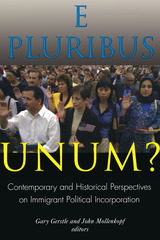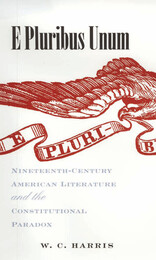2 books about E Pluribus Unum

E Pluribus Unum?
Contemporary and Historical Perspectives on Immigrant Political Incorporation
Gary Gerstle
Russell Sage Foundation, 2001
The political involvement of earlier waves of immigrants and their children was essential in shaping the American political climate in the first half of the twentieth century. Immigrant votes built industrial trade unions, fought for social protections and religious tolerance, and helped bring the Democratic Party to dominance in large cities throughout the country. In contrast, many scholars find that today's immigrants, whose numbers are fast approaching those of the last great wave, are politically apathetic and unlikely to assume a similar voice in their chosen country. E Pluribus Unum? delves into the wealth of research by historians of the Ellis Island era and by social scientists studying today's immigrants and poses a crucial question: What can the nation's past experience teach us about the political path modern immigrants and their children will take as Americans? E Pluribus Unum? explores key issues about the incorporation of immigrants into American public life, examining the ways that institutional processes, civic ideals, and cultural identities have shaped the political aspirations of immigrants. The volume presents some surprising re-assessments of the past as it assesses what may happen in the near future. An examination of party bosses and the party machine concludes that they were less influential political mobilizers than is commonly believed. Thus their absence from today's political scene may not be decisive. Some contributors argue that the contemporary political system tends to exclude immigrants, while others remind us that past immigrants suffered similar exclusions, achieving political power only after long and difficult struggles. Will the strong home country ties of today's immigrants inhibit their political interest here? Chapters on this topic reveal that transnationalism has always been prominent in the immigrant experience, and that today's immigrants may be even freer to act as dual citizens. E Pluribus Unum? theorizes about the fate of America's civic ethos—has it devolved from an ideal of liberal individualism to a fractured multiculturalism, or have we always had a culture of racial and ethnic fragmentation? Research in this volume shows that today's immigrant schoolchildren are often less concerned with ideals of civic responsibility than with forging their own identity and finding their own niche within the American system of racial and ethnic distinction. Incorporating the significant influx immigrants into American society is a central challenge for our civic and political institutions—one that cuts to the core of who we are as a people and as a nation. E Pluribus Unum? shows that while today's immigrants and their children are in some ways particularly vulnerable to political alienation, the process of assimilation was equally complex for earlier waves of immigrants. This past has much to teach us about the way immigration is again reshaping the nation.
[more]

E Pluribus Unum
Nineteenth-Century American Literature and the Constitutional Paradox
Harris, W. C.
University of Iowa Press, 2005
“Out of many, one.” But how do the many become one without sacrificing difference or autonomy? This problem was critical to both identity formation and state formation in late 18th- and 19th-century America. The premise of this book is that American writers of the time came to view the resolution of this central philosophical problem as no longer the exclusive province of legislative or judicial documents but capable of being addressed by literary texts as well.
The project of E Pluribus Unum is twofold. Its first and underlying concern is the general philosophic problem of the one and the many as it came to be understood at the time. W. C. Harris supplies a detailed account of the genealogy of the concept, exploring both its applications and its paradoxes as a basis for state and identity formation.
Harris then considers the perilous integration of the one and the many as a motive in the major literary accomplishments of 19th-century U.S. writers. Drawing upon critical as well as historical resources and upon contexts as diverse as cosmology, epistemology, poetics, politics, and Bible translation, he discusses attempts by Poe, Whitman, Melville, and William James to resolve the problems of social construction caused by the paradox of e pluribus unum by writing literary and philosophical texts that supplement the nation’s political founding documents.
Poe (Eureka), Whitman (Leaves of Grass), Melville (Billy Budd), and William James (The Varieties of Religious Experience) provide their own distinct, sometimes contradictory resolutions to the conflicting demands of diversity and unity, equality and hierarchy. Each of these texts understands literary and philosophical writing as having the potential to transform-conceptually or actually-the construction of social order.
This work will be of great interest to literary and constitutional scholars.
The project of E Pluribus Unum is twofold. Its first and underlying concern is the general philosophic problem of the one and the many as it came to be understood at the time. W. C. Harris supplies a detailed account of the genealogy of the concept, exploring both its applications and its paradoxes as a basis for state and identity formation.
Harris then considers the perilous integration of the one and the many as a motive in the major literary accomplishments of 19th-century U.S. writers. Drawing upon critical as well as historical resources and upon contexts as diverse as cosmology, epistemology, poetics, politics, and Bible translation, he discusses attempts by Poe, Whitman, Melville, and William James to resolve the problems of social construction caused by the paradox of e pluribus unum by writing literary and philosophical texts that supplement the nation’s political founding documents.
Poe (Eureka), Whitman (Leaves of Grass), Melville (Billy Budd), and William James (The Varieties of Religious Experience) provide their own distinct, sometimes contradictory resolutions to the conflicting demands of diversity and unity, equality and hierarchy. Each of these texts understands literary and philosophical writing as having the potential to transform-conceptually or actually-the construction of social order.
This work will be of great interest to literary and constitutional scholars.
[more]
READERS
Browse our collection.
PUBLISHERS
See BiblioVault's publisher services.
STUDENT SERVICES
Files for college accessibility offices.
UChicago Accessibility Resources
home | accessibility | search | about | contact us
BiblioVault ® 2001 - 2024
The University of Chicago Press









